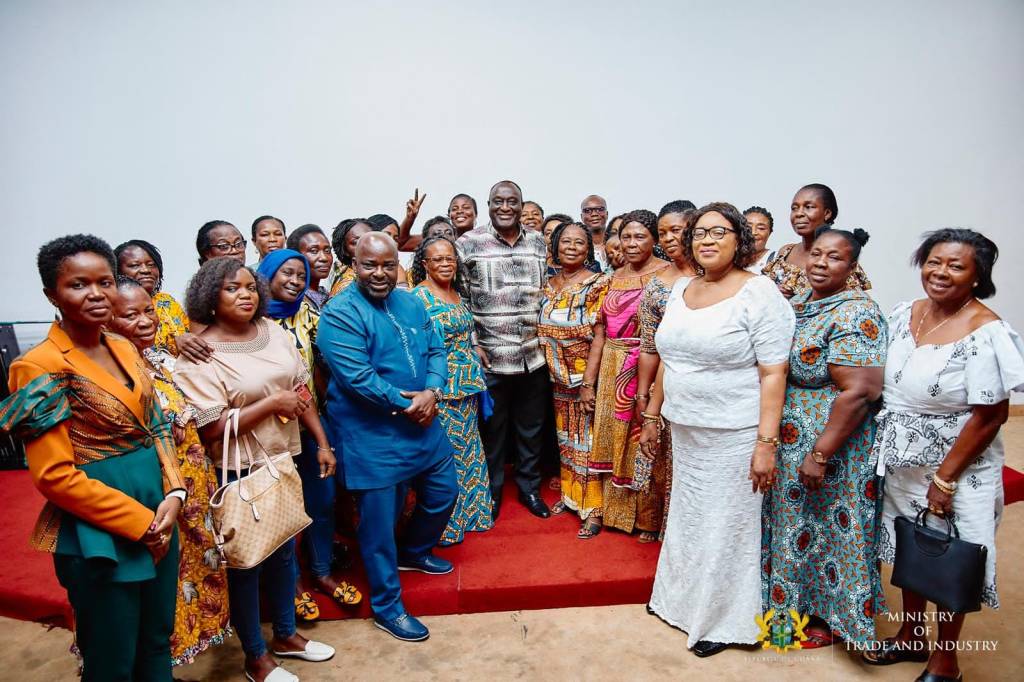Commissioning of the First Locally-Assembled Suzuki Swift Vehicle


 Loading...
Loading...

The Ministry of Trade and Industry has held another national engagement forum with textiles wholesalers and retailers on the implementation of the Textiles Tax Stamps Policy. This engagement followed an earlier one with Importers which was held on 27th May, 2022 at the African Regent Hotel, Airport-Accra and forms part of the preparations towards the launch and implementation of the policy before the close of the year.
According to the sector Minister, Alan Kyerematen, the aim of the engagement was to “sensitize and educate the public, particularly dealers in the industry on the introduction/implementation of the textiles tax stamps as part of the Government’s commitment to addressing the challenges of the textiles industry as well as developing the sector to harness the significant gains the sector stands to offer”.
The minister revealed that the local demand for African prints is about 120 million yards per annum, of which the local supply is just about 35% (42million yards), with the remaining 65% imported. Hon Kyerematen recalled that the local textiles industry used to be very vibrant in the last three decades, but that the influx of pirated designs and gross infringements on trademarks of local textile manufacturers have been identified as two of the key areas which have adversely affected the textiles Industry in Ghana.
Towards addressing the situation, the Minister said in 2018 the Ministry of Trade and Industry under the Industrial Transformation Agenda of Government announced Six Policy Measures aimed at finding lasting solutions to the challenges and also strengthening the textiles sector which can create millions of well-paid jobs for Ghanaians, namely:
The Minister was of the firm belief that these policy measures will lead to the development of the local textile firms to reduce the import of pirated textiles by promoting local manufacturing.
He assured the stakeholders that with the introduction of the measures, importation is still allowed since the country does not currently have the local manufacturing capacity to meet the total national demand of over 120 million yards per annum. He was hopeful that the policies were going to help streamline the imports of textiles and further ensure that all the players involved in the textiles industry benefit.
The roll-out of the textiles tax stamps has been scheduled for November 1, 2022 and the implementation modalities shall include having textiles stamps affixed on all textile prints traded in Ghana.

Participants used the opportunity to ask questions related to the discussions, from the team from the Ministry of Trade and Industry, Ministry of Finance, Ghana Revenue Authority-Domestic Tax Revenue Division, Intellectual Property Office and Ghana Standards Authority who responded accordingly.
Minister of Trade and Industry, Alan Kyerematen, has called on governments of African countries to put in place the needed institutional and logistical support frameworks to ensure that they collectively reap the full benefits from the implementation of the African Continental Free Trade Area agreement.
Speaking at the launch of the Africa Guided Trade Initiative in Accra, the Minister stressed that “at our national levels, we should have institutional structures and a programme of action for boosting intra African trade to enable entrepreneurs to produce to take advantage of the huge market provided by the agreement. We must ensure that we have the logistics support to ensure that we are able to move the goods from one country to another”.
According to Ghana’s Trade and Industry Minister, the launch “symbolizes that AfCFTA is not just on paper but a reality. And we are moving from talk and negotiations to action. It also symbolizes that governments in Africa who have been involved in the negotiations are now giving way to the private sector to make it a reality,”.
The guided trade initiative was launched for seven member countries. These seven countries which have signaled their readiness to start trading under AfCFTA were Tanzania, Mauritania, Kenya, Egypt, Cameroon, Rwanda, and Ghana.

Speaking at the same event, Secretary-General of the AfCFTA Secretariat, Wamkele Mene said at least 96 different products from the seven countries could be freely traded under the rules of AfCFTA. Products approved to trade under AfCFTA include horticultural products, pharmaceuticals, rubber, aluminum kitchenware, sugar, steel, and wooden products. These products originating from Africa will enjoy duty-free and quota-free trading among the partnering countries.
“This is the moment the founding mothers and fathers of the Organization of African Unity have longed (for). We have finally honored and made reality the vision of those who liberated our continent,” said Mene. “We are connecting East Africa to West Africa, North Africa to Southern Africa. Trade will be the driver of inclusivity, creating opportunities for young Africans. So we have taken the first journey today, and I hope in 15 years, we will have succeeded in lifting millions and millions of Africans out of poverty.”
Ghanaians in the diaspora have been called upon to support the country’s industrialization drive by by investing in the Ghanaian economy. This is particularly important as no country has been able to develop without industrialisation as one of its strongest pillars. For industrialization to succeed, however, investment capital from the Diaspora is critical.
Speaking at an awards gala organised by the Ghana Diaspora Public Affairs Collective (GHPAC) in Washington DC-USA, Alan Kyerematen, Minister of Trade and Industry, who made the call, said, “We are fully convinced that Ghana cannot succeed in her quest to become an industrialized country without the full support and participation of her Diaspora citizens”
“Beyond the remittances, you send back home to support your families, Diasporans have increasingly become a great source of capital, creativity, entrepreneurship, technology, and knowledge transfer. Diasporans have made us proud in many ways and we intend to leverage your capabilities and networks,” he added.
The Trade Minister lauded the establishment of GHPAC as an opportunity to woo diaspora investments into Ghana to propel growth and development. “Our strategic approach to harnessing the capabilities and network of Ghanaians in the diaspora is based on a number of considerations, including an improvement in the business environment; enhancing the productive capacity of Small and Medium Scale Enterprises (SMEs) to produce for both export and local consumption; providing fiscal and non-fiscal incentives for manufacturing; and improving access to foreign markets,” he explained.

The Minister used the occasion to express gratitude, especially to the United States for their relentless support and investments towards key socio-economic initiatives undertaken in Ghana over the years. He cited the Millennium Challenge Corporation, and the African Growth and Opportunity Act (AGOA) as some examples of support offered by the US. “Currently, the United States is supporting Ghana to implement a number of projects aimed at enhancing the Ghanaian private sector operators’ productive capacities to take advantage of numerous market opportunities at home and abroad,” Alan Kyerematen said.
The GHPAC is a nonpartisan, non-profit social welfare advocacy collective dedicated to empowering Ghanaians in the Diaspora. It focuses on civic and political action which is instrumental in helping Ghana achieve its industrial transformation goal.



